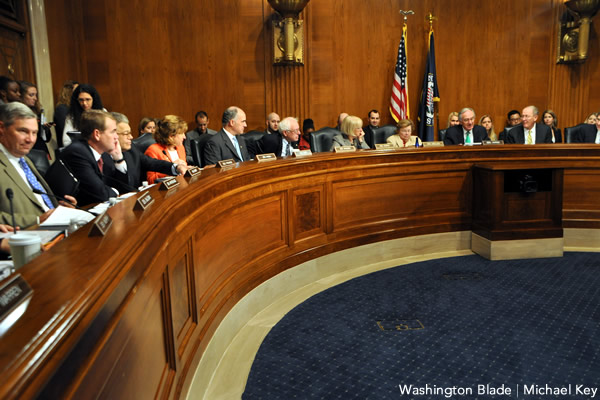Politics
HISTORIC: Senate panel advances trans-inclusive ENDA
In first, committee reports out trans-inclusive LGBT anti-bias bill


Senate Health, Education, Labor & Pensions Committee approved a trans-inclusive ENDA on Wednesday (Washington Blade photo by Michael Key)
A Senate committee made history on Wednesday by approving for the first time a trans-inclusive version of the Employment Non-Discrimination Act and picking up key Republican support from Sens. Orrin Hatch (R-Utah) and Lisa Murkowski (R-Alaska).
Lawmakers on the Senate Health, Education, Labor & Pensions Committee reported out ENDA by a 15-7 vote after a short period of discussion. No amendments were offered except for a manager’s amendment, although Sen. Lamar Alexander (R-Tenn.) said he’ll reserve three that he planned for consideration on the Senate floor.
Senate HELP Committee Chair Tom Harkin (D-Iowa) noted the historic nature of the committee’s action prior to the vote and said it’s “time, long past time” for Congress to take action against LGBT workplace discrimination.
“Qualified workers should not be turned away or have to fear losing their livelihood for reasons that have nothing to do with their qualifications, skills or performance,” Harkin said. “Let’s not mince words: such practices are un-American. They should have no place in any American workplace.”
All 12 Democrats on the committee, including lesbian Sen. Tammy Baldwin (D-Wis.), are co-sponsors of the bill as well as one Republican, Sen. Mark Kirk (R-Ill.). They each voted in favor of ENDA during the final vote.
At the start of the markup, Kirk explained he has supported ENDA — both in his capacity as a U.S. House member and a U.S. senator — because gay people should “not have that cloud of potential discrimination” in the workplace.
Speaking with reporters afterwards, Kirk explained his support for ENDA derives in part from his work as an officer in the Navy Reserve.
“For me, as you guys know, I’m a military guy,” Kirk said. “We think about how blindingly idiotic it was for Adolf Hitler to discriminate against the Jews. When you think about all the Senate pieces of the Manhattan Project, we actually developed a war-winning weapon because we were protecting creativity and science, and we became a much stronger society that allowed us to prevail. The society that is more open will be stronger, in my view, probably economically and militarily.”

Sen. Mark Kirk (R-Ill.) and Sen. Tammy Baldwin (D-Wis.) (Washington Blade photo by Michael Key)
New support for ENDA also came from Republicans on the panel: Hatch and Murkowksi. Hatch voted “yes” by proxy and Murkowski voted “yes” in person. The Alaska senator is the third sitting Republican U.S. senator to come out in favor of marriage equality.
In a statement after the markup, Murkowski said she voted “yes” because “discrimination should never be tolerated in the workplace.”
“I am a strong believer that individuals should be judged on whether they can do the job, not their sexual orientation – and I appreciate the hundreds of Alaskans who shared their thoughts with me and my staff as we considered this bill,” Murkowski said.
While she said improvements to the bill “might be in order in the form of floor amendments,” Murkowski added she’s pleased ENDA addresses “employers’ needs to run efficiently and reduce compliance costs” by prohibiting discrimination claims based on disparate impact.
In a statement provided to the Washington Blade, Hatch explained he was able to support ENDA because of the strong religious exemption in the bill.
“I appreciate that the authors of the bill were willing to include a robust religious exemption in this bill,” Hatch said. “I voted for it because it prohibits discrimination that should not occur in the workplace, it protects the rights of religious entities, and minimizes legal burdens on employers.”
The bill now heads to full Senate for passage on the floor, where 60 votes will likely be necessary to overcome a Senate filibuster. During the markup, Harkin said he expects ENDA to come to the floor “sometime in the fall,” but not before lawmakers leave for August break.
Asked by the Washington Blade after the committee vote whether he’s confident that ENDA will find 60 votes on the Senate floor, Harkin replied, “Yeah, I think we’ll have 60 votes.”
“As you saw, we had some very key Republicans on the committee, and that will be very helpful,” Harkin said. “As I said, I think society is there, and the things that have recently happened with the Supreme Court decision and others, I think we’re ready to move on in a way that we haven’t been ready move on in the past. Keep your fingers crossed.”
But Senate Majority Leader Harry Reid (D-Nev.) is responsible for scheduling what comes to the floor in the Senate. His office didn’t immediately respond to a request for comment on when an ENDA floor vote would take place. In his Pride statement issued last month, Reid said he looks forward to bringing up ENDA “soon.”
White House Press Secretary Jay Carney issued a statement saying President Obama “welcomes” the bipartisan support ENDA received in committee and looks forward to further action.
“The President has long supported an inclusive ENDA, which would enshrine into law strong, lasting and comprehensive protections against employment discrimination on the basis of sexual orientation or gender identity,” Carney said. “We look forward to the full Senate’s consideration of ENDA, and continue to urge the House to move forward on this bill that upholds America’s core values of fairness and equality.”
It was the first markup of ENDA in the Senate since 2002 and the first time ever a committee in either chamber of Congress approved a version of ENDA that protects not only gay, lesbian and bisexual people from workplace discrimination, but also transgender people.
Mara Keisling, executive director of the National Center for Transgender Equality, said a trans-inclusive ENDA has been advancing all along, but committee approval of the bill with gender identity protections is “really amazing.”
“This is a life-or-death issue for trans people, and I think this shows that we’re moving, we’re going to get it done,” Keisling said. “Next, we’re going to get it passed in the Senate, and we’re going to try to figure out how to get it through the dysfunctional House of Representatives. But it’s really important and shows trans people everywhere that this is going to happen — whether it’s this year or another year — it’s going to happen. We are going to get relief from job discrimination.”
Transgender inclusion in ENDA has been a sensitive issue in the LGBT community. In 2007, gay former Rep. Barney Frank (D-Mass.) removed ENDA’s gender identity provisions before holding a House vote on the bill because he said the votes were lacking to pass the legislation with those protections on the House floor. The decision led to an outcry and ENDA advanced no further even though Democrats controlled both chambers of Congress.
Tico Almeida, president of Freedom to Work, praised the Senate committee approval of ENDA, calling the vote “fantastic.”
“It was a big, bipartisan win, and we’re going this ride momentum to 60 votes by September,” Almeida said. “We think we can get to 60 votes in the Senate in September — possibly October if it takes that long. We could actually get between 60 and 65 votes in the end in the Senate, and that huge momentum will allow us to do some real campaigning with members of the House.”
Despite the support ENDA’s religious exemption has received from Republicans like Hatch, there are differing opinions on the language within the LGBT community.
Unlike existing employment discrimination law under Title VII of the Civil Rights Act, ENDA’s religious exemption provides leeway for religious organizations, like churches or religious schools, to discriminate against LGBT employees.
Some ENDA supporters, like the Center for American Progress, say ENDA’s religious exemption is politically necessary for the bill to pass Congress, while others, like the American Civil Liberties Union, say it allows for continued LGBT workplace discrimination. No action was taken on the religious exemption during the markup.
Ian Thompson, legislative representative for the ACLU, said after the markup he’s pleased with the progress on ENDA, but added the growing support for LGBT rights demonstrates the bill’s religious exemption may no longer be necessary.
“Today’s vote clearly demonstrates that the tide has turned on LGBT rights,” Thompson said. “What was true five, 10, and 20 years ago is no longer the case. To that end, I think it is becoming increasingly clear that there is no reason to adopt an exemption that would needlessly dilute ENDA’s critical protections.”
Before final passage, the committee approved by unanimous consent a manager’s amendment that made technical changes to ENDA.
Some changes were made at the behest of GOP supporters who wanted clarification on certain issues. Among them is ensuring under ENDA disparate impact claims are not allowed; a plaintiff cannot recover for the same offense under both Title VII of the Civil Rights Act and ENDA; and an employer can amend an existing poster notifying employees of the non-discrimination policy, rather than creating a separate poster.
The manager’s amendment also updates ENDA in the wake of Supreme Court rulings on employment non-discrimination law. Following the Supreme Court’s decision in the 2009 case of Gross v. FBL Financial, the bill now includes language to ensure that the burden of proof in mixed motive cases is the same under ENDA as it is under Title VII.
Almeida, who had called for an update to ENDA in the wake of the Gross ruling, commended Harkin and his counsel for “fixing the loopholes and technical mistakes” that existed in the original version of ENDA.
“Some were on the left, and some were on the right,” Almeida said. “By making these corrections, Chairman has shown respect for Republicans on the committee and created a smarter, better Employment Non-Discrimination Act.”
Politics
Rep. Grijalva reiterates LGBTQ support at swearing in
‘That’s what the American people expect us to do — fight for them’

Adelita Grijalva, Arizona’s new 7th District representative, was sworn into Congress last week, vowing to hold the Trump–Vance administration accountable and to protect LGBTQ rights.
Grijalva becomes the first Latina ever to represent the state of Arizona.
Her swearing in was delayed by a record 50 days because she vowed to be the deciding House vote in favor of a discharge petition to release the Epstein files, although House Speaker Mike Johnson blamed the delay on the federal government shutdown.
She began her speech by honoring her late father, Raúl Grijalva, who represented the same district until his death earlier this year.
“I rise today, the proud granddaughter of a bracero – a hard-working Mexican immigrant who came to this country with hope for a better life,” said Rep. Grijalva. “And I stand as the proud daughter of a U.S. congressman – a man who spent his entire life fighting for justice, equity, and dignity for the most vulnerable. From working as a vaquero, to serving in Congress in just a single generation – that is the promise of this country.”
During her swearing-in remarks, she referenced the slew of issues surrounding her election — most notably the release of the Epstein files, her support for immigrants, and her support of the LGBTQ community, especially trans people, as rhetoric from the Trump–Vance administration has increasingly vilified them.
“What is most concerning is not what this administration has done, but what the majority in this body has failed to do: hold Trump accountable as the co-equal branch of government that we are.”
“We need to fight for our immigrant communities and veterans. We need to stand up for our public schools, children, and educators. We need to respect tribal sovereignty and our environment. We need to stand up for LGBTQ+ rights. Because that’s what the American people expect us to do — fight for them. That is why I will sign the discharge petition right now to release the Epstein files, because justice cannot wait another day. Adelante mi gente. Muchas Gracias!”
This sentiment echoes what she told the Blade in an exclusive interview earlier this month, in which she emphasized that speaking up for the most marginalized is part of her duty as a representative.
“Trans rights are human rights. That’s it,” she said firmly. “When I say I’ll speak up for those who don’t feel they have a voice, I mean everybody — especially people who’ve been pushed to the margins.”
Politics
Pro-trans candidates triumph despite millions in transphobic ads
Election results a potential blueprint for 2026 campaigns

Activists and political observers say the major Democratic victories on the East Coast last week prove anti-transgender attacks are no longer effective.
Democrats in Virginia, New Jersey, and New York who defended transgender rights directly — Abigail Spanberger, Mikie Sherrill, and Zohran Mamdani — won decisively, while Republicans who invested millions in anti-trans fearmongering were rejected by voters.
This contrasts sharply with the messaging coming out of the White House.
The Trump-Vance administration has pursued a hardline anti-trans agenda since taking office, from attempting to ban trans military members from serving to enforcing bathroom and sports bans. But this winning strategy may not be as solid for their voters as it once seemed.
The Washington Blade attended a post-election meeting hosted by the Human Rights Campaign, where LGBTQ advocates and political leaders reflected on the results and discussed how to build on the momentum heading into 2026 — as the Trump-Vance administration doubles down on its anti-trans agenda.
Among those on the call was U.S. Rep. Sarah McBride (D-Del.), the first openly trans person ever elected to Congress. Having run one of the nation’s most visible pro-trans campaigns, McBride said voters made their priorities clear.
“Voters made clear yesterday that they will reject campaigns built on hatred. They will reject campaigns that seek to divide us, and they will reject candidates that offer no solutions for the cost-of-living crisis this country is facing.”
McBride cited the Virginia governor’s race as a clear example of how a candidate can uplift trans people — specifically when their opponent is targeting kids — but also refocus the conversation on topics Americans truly care about: the economy, tariffs, mortgage rates, and the preservation of democracy.
“We saw millions of dollars in anti-trans attacks in Virginia, but we saw Governor-elect Spanberger respond. She defended her trans constituents, met voters with respect and grace, and ran a campaign that opened hearts and changed minds,” McBride said.
“That is the future of our politics. That is how we win — by combating misinformation, caricatures, fearmongering, and scapegoating.”
She added that the elections in Virginia, New Jersey, and New York offer a “blueprint” for how Democrats can effectively respond to GOP attacks and win “in the face of hatred.”
“When you dive into the data and you look in New Jersey, Virginia — you see the progress that pro-equality candidates have made in urban, suburban, and rural communities, among voters of every background and identity,” McBride said. “You see that we can compete everywhere … When we perform a politics that’s rooted in three concepts, we win.
“One is a politics of affordability — we prioritize the issues keeping voters up at night, the cost-of-living crisis. Two, we are curious, not judgmental — as candidates, we meet people where they are, hold true to our values, but extend grace so people can grow. And three, we root our politics in a sense of place.”
“All of these candidates were deeply committed to their districts, to their state, to their city,” she continued. “Voters responded because they were able to see a politics that transcended partisanship and ideology … about building community with one another, across our disagreements and our differences. When we as pro-equality candidates embody that type of politics — a politics of affordability, curiosity, and community — we win.”
Human Rights Campaign President Kelley Robinson echoed McBride’s sentiment — once again moving away from the bogeyman Republicans have made trans children out to be and refocusing on politics that matter to people’s everyday lives.
“Anti-trans extremists poured millions into fearmongering, hoping cruelty could substitute for leadership — and once again, it failed,” Robinson said. “Fear can’t fill a prescription. Division doesn’t lower rent or put food on the table. Voters saw through the distraction.”
Robinson then detailed how much money Virginia Lt. Gov. Winsome Earle-Sears, the Republican who challenged Spanberger, spent on these ads — showing that even with money and a PAC standing behind her (like the Republican Governors Association’s Right Direction PAC, which gave her $9.5 million), success isn’t possible without a message that connects with constituents.
“In Virginia, Abigail Spanberger made history defeating Winsome Earle-Sears and more than $9 million of anti-trans attack ads. She didn’t flinch. She didn’t hide from her values. She led with them — and Virginians rewarded that courage.”
Equality Virginia Executive Director Narissa Rahaman went into further detail on how the Republican nominee for Virginia’s governor leaned into transphobia.
“Winsome Earle-Sears spent more than 60 percent of her paid media budget attacking transgender kids — an unprecedented amount — and it failed.”
Rahaman continued, saying the results send a message to the whole country, noting that only 3 percent of voters ranked trans issues as a top concern by the end of October.
“Virginia voters sent a resounding message that anti-trans fearmongering is not a winning strategy — not here in Virginia, and not anywhere else,” Rahaman said. “Candidates who met these attacks head-on with messages rooted in freedom, safety, and fairness saw overwhelming success. Attacking transgender youth is not a path to power. It is a moral dead end — and a political one too.”
Virginia state Del. Joshua Cole (D-Fredericksburg), who was also on the call, put it bluntly:
“Republicans have now become champions of campaigning on bullying kids — and we saw last night that that was a losing tactic.”
“Virginians came out en masse to say we believe in protecting our neighbors, protecting our friends — and standing up for everybody.”
That message rang true well beyond Virginia.
In New Jersey, Rep. Mikie Sherrill pushed back against GOP efforts to weaponize trans issues, telling voters, “When you really talk to people, they have empathy. They understand these are kids, these are families, and they deserve our support.”
And in New York, state Assemblymember Zohran Mamdani released a pre-election ad honoring trans liberation icon Sylvia Rivera, declaring, “New York will not sit idly by while trans people are attacked.”

Former Vice President Dick Cheney died of complications from pneumonia and cardio and vascular disease, according to a family statement released Tuesday morning. He was 84.
Cheney served as vice president under President George W. Bush for eight years and previously as defense secretary under President George H.W. Bush. He also served as a House member from Wyoming and as White House chief of staff for President Gerald Ford.
“Dick Cheney was a great and good man who taught his children and grandchildren to love our country, and to live lives of courage, honor, love, kindness, and fly fishing,” his family said in a statement. “We are grateful beyond measure for all Dick Cheney did for our country. And we are blessed beyond measure to have loved and been loved by this noble giant of a man.”
Cheney had a complicated history on LGBTQ issues; he and wife Lynne had two daughters, Liz Cheney and Mary Cheney, who’s a lesbian. Mary Cheney was criticized by LGBTQ advocates for not joining the fight against President George W. Bush’s push for a constitutional amendment banning gay marriage. She later resumed support for LGBTQ issues in 2009, including same-sex marriage, after her father left office in 2009. She married her partner since 1992, Heather Poe, in 2012.
In 2010, after leaving office, Cheney predicted “Don’t Ask, Don’t Tell” would “be changed” and expressed support for reconsideration of the law banning open military service.
In 2013, the Cheney family’s disagreements over marriage equality spilled into the public eye after Liz Cheney announced her opposition to same-sex couples legally marrying. Mary Cheney took to Facebook to rebuke her sister: “Liz – this isn’t just an issue on which we disagree – you’re just wrong – and on the wrong side of history.” Dick and Lynne Cheney were supporters of marriage equality by 2013. Liz Cheney eventually came around years later.
Cheney, a neo-con, was often criticized for his handling of the Iraq war. He was considered one of the most powerful and domineering vice presidents of the modern era. He disappeared from public life for years but re-emerged to help Liz Cheney in her House re-election bid after she clashed with President Trump. Dick Cheney assailed Trump in a campaign video and later Liz announced that her father would vote for Kamala Harris in the 2024 presidential election.




















